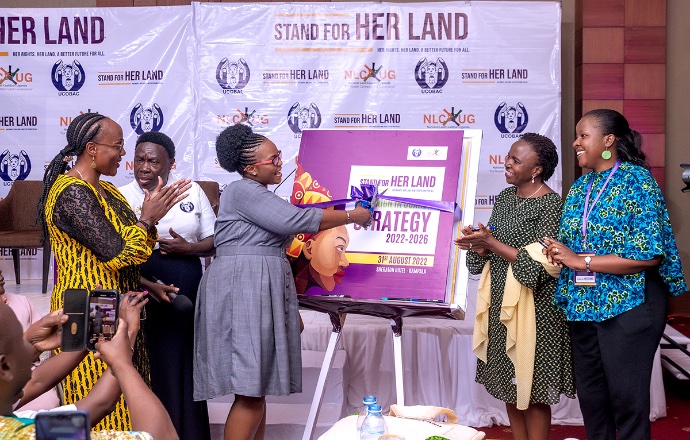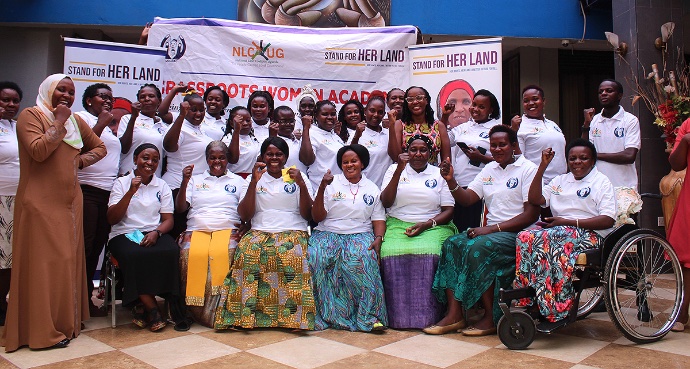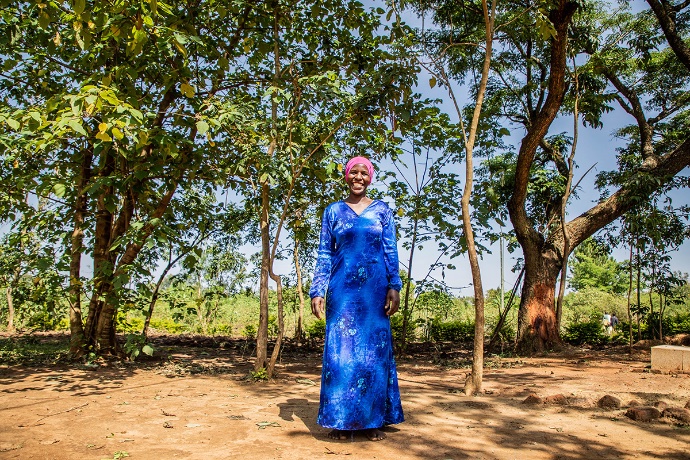By Esther Mwaura-Muiru, Stand for Her Land Global Advocacy Director

The S4HL Uganda Coalition launches in 2022. Photo: Landesa
A non-profit organization focused on smallholder farmer livelihoods. A government land governance learning week. An investigative radio show protecting human rights.
In Uganda, development initiatives pursuing a common agenda to address gender inequality and sustainable development have found a unifying theme: women’s land rights. The Stand for Her Land (S4HL) Uganda Coalition—part of S4HL, the global campaign for women’s land rights—brings together civil society organizations, government stakeholders, and other key actors in a collective movement to realize women’s fundamental rights to land, properties, housing, and natural resources.
The S4HL Uganda Coalition launched in 2022. Today, the non-profit supporting smallholder farmers is currently developing a women’s land rights strategy. The annual government land governance learning week now includes grassroots women as key constituents and leaders, and the investigative radio platform has begun to spotlight the plights of women’s land rights defenders.
Through S4HL Uganda’s Coalition structure, members strategize and act together to build political will for women’s land rights at grassroots, national, and global levels. Connecting local organizations and leaders enables a movement that is exponentially more powerful than members acting alone. Members learn from each other’s successes, elevate one another’s messages, and advocate jointly for change. Coordinating this powerful network of 85 NGOs and community-based organizations is Uganda Community-Based Association for Women and Children’s Welfare (UCOBAC), a Kampala-based organization with more than 30 years of experience in community organizing and advocacy.
Grassroots organizations like those in the S4HL Uganda Coalition are more vital than ever. Geography-specific challenges necessitate people who know the context. Messy, unrelenting obstacles like tightly held social norms and persistent patriarchal practices and behaviors call for creative, ground-up solutions. It is up to the global development community to meaningfully support grassroots organizations to carry out this indispensable work.

S4HL Uganda’s Grassroots Women Academy. Photo: Landesa
Mobilizing Grassroots Voices to Address Global Challenges
In the case of women’s land rights, we are not missing the proof. We know that securing women’s rights to land can have ripple effects to reduce poverty, food insecurity, and domestic violence, and is foundational to fulfilling gender equality and sustainable development. We have evidence that efforts to protect biodiversity and address climate change are more successful when women have strong land rights. when women have strong land rights.
What we are lacking is a collective approach, with bold shifts related to power and resourcing that put grassroots women at the center of transformative development. Through S4HL, Landesa and other Global Steering Committee members offer more than just financial resources tied to projects.
Key to the S4HL model is the facilitation of each Coalition network in addition to global facilitation. Grassroots voices—especially those of grassroots women—have been absent from global advocacy spaces for far too long. Just recently, Landesa and partners facilitated grassroots women from different S4HL Coalitions to participate in high-level conversations at the United Nations Convention to Combat Desertification (UNCCD) COP16.
S4HL member organizations benefit from Landesa’s technical capacity around land governance, but also around understanding the mechanisms that drive global advocacy. The S4HL Global Steering Committee supports grassroots organizations to build relationships with key actors like UN Women to strengthen the movement for women’s land rights.
S4HL also offers a global platform that amplifies our members’ advocacy messages so we can drive progress at scale.

In Butaleja, Uganda, women’s land rights are crucial to both food security and wetland conservation. Photo: Zahara Abdul
To Build a Movement, Invest in Partnerships From the Ground Up
S4HL has seen sweeping momentum over recent years. It is a movement larger than any one project or country. Yet there is still much progress to make before women’s land rights are a reality worldwide. We have five years remaining of the Sustainable Development Goals, which include women’s equal access to ownership and control over land.
The same momentum is apparent across global development sectors. We must not let this momentum slip away in the coming years.
In this moment, as a global development community we have an opportunity to ensure our action is truly making a positive, lasting impact. The best way we can ensure this is by supporting grassroots partners—with funds, capacity, and platforms—so that as a global society, we can truly drive progress.